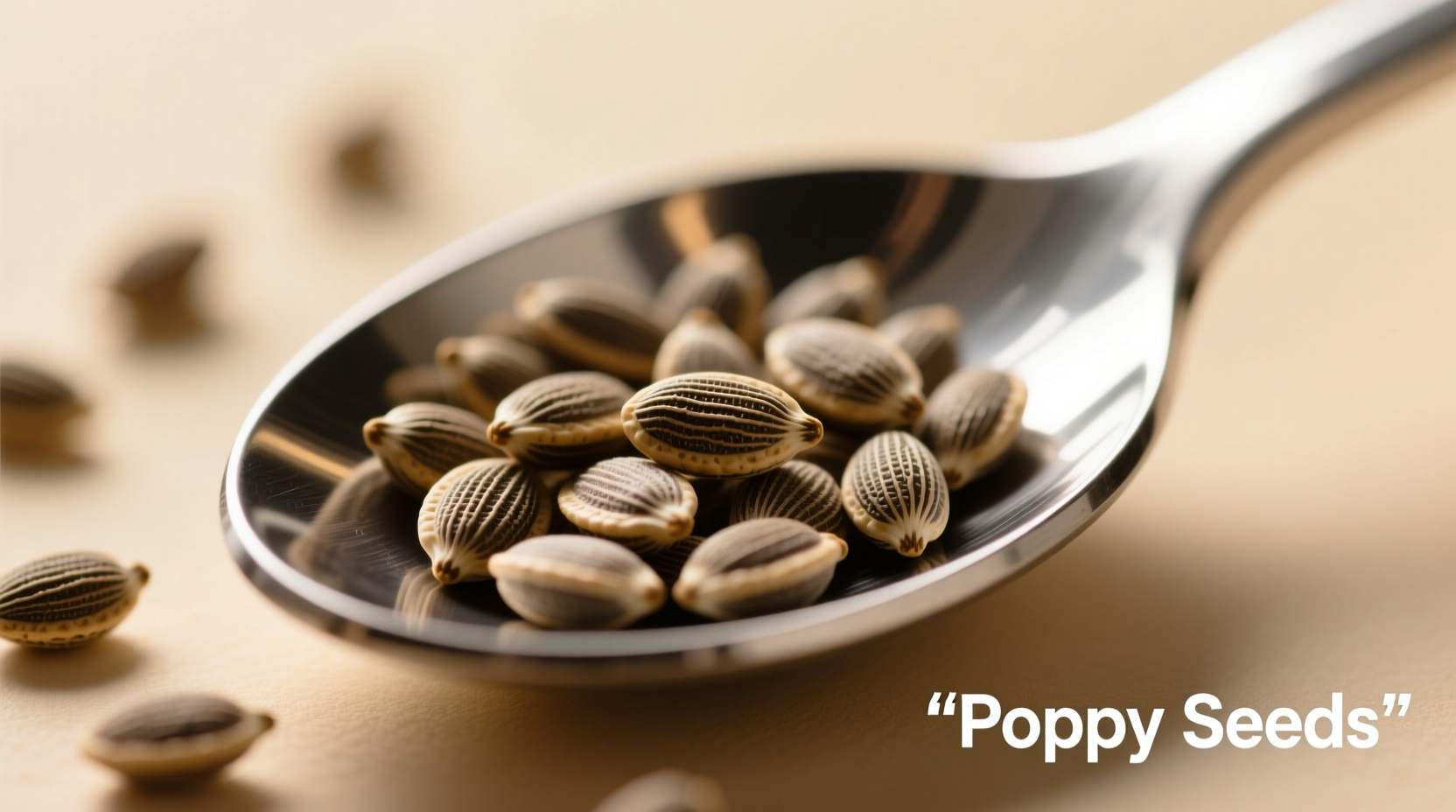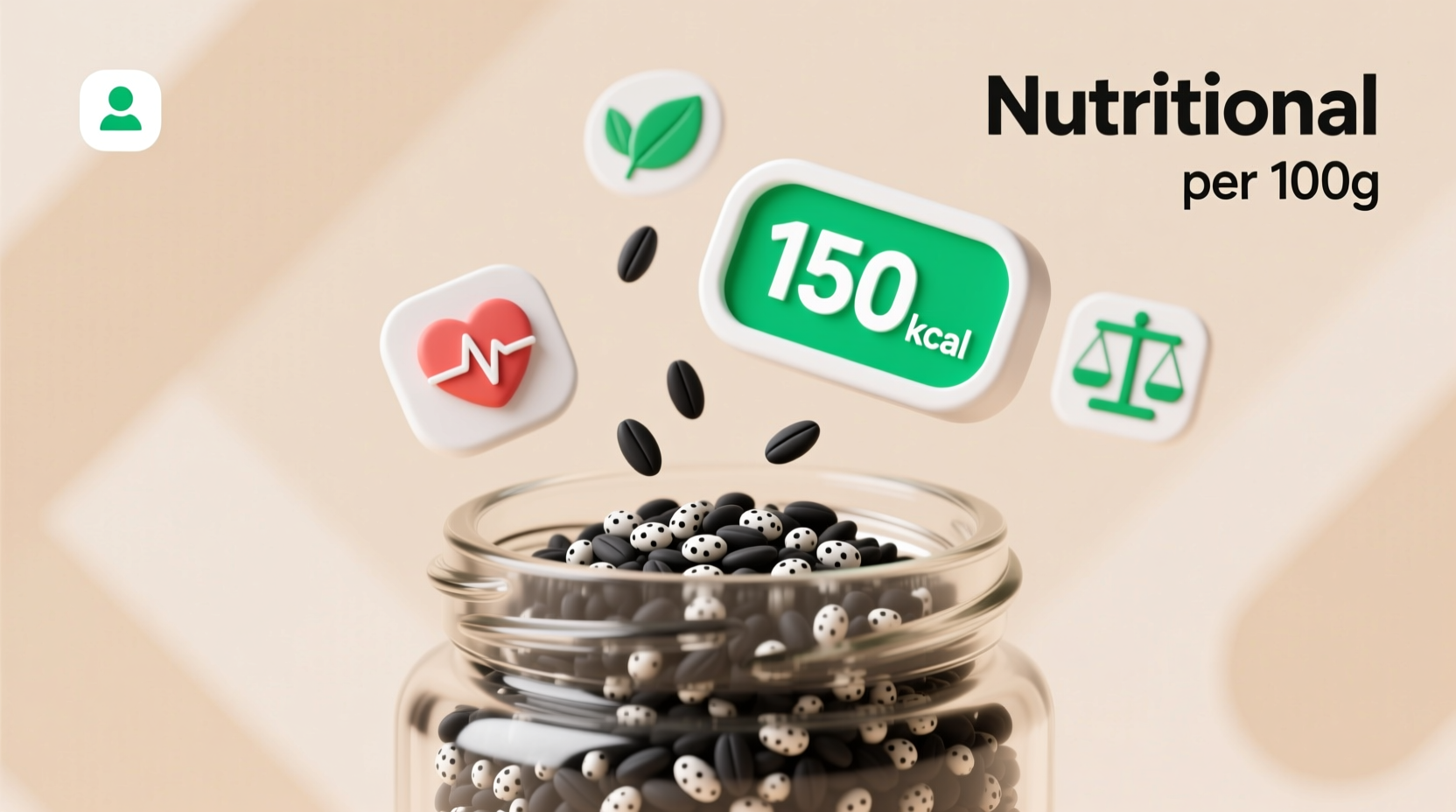Understanding the exact calorie content of ingredients like poppy seeds is essential for meal planning, dietary tracking, and maintaining nutritional balance. As a culinary professional who's worked with spices at every level from Michelin-starred kitchens to home cooking demonstrations, I've seen how small ingredients can significantly impact overall calorie counts when used regularly.
Poppy Seed Nutrition: Beyond Just Calories
While the calorie count is important, poppy seeds offer valuable nutrients that make them worth including in your diet. According to the USDA FoodData Central database, which maintains the most comprehensive and regularly updated nutritional information, poppy seeds provide significant amounts of essential minerals and healthy fats.
| Nutrient | Per Tablespoon (9g) | Per Ounce (28g) | Daily Value % |
|---|---|---|---|
| Calories | 46 | 148 | 7% |
| Total Fat | 3.9g | 12.5g | 16% |
| Saturated Fat | 0.4g | 1.4g | 2% |
| Carbohydrates | 2.9g | 9.2g | 1% |
| Dietary Fiber | 1.6g | 5.1g | 6% |
| Protein | 1.8g | 5.6g | 4% |
| Calcium | 127mg | 404mg | 31% |
| Iron | 1.3mg | 4.1mg | 7% |
| Magnesium | 34mg | 108mg | 8% |
Source: USDA FoodData Central, Poppy Seeds, Raw
How Poppy Seeds Compare to Other Common Seeds
When tracking calories, it's helpful to understand how poppy seeds compare to other popular seeds. While all seeds are calorie-dense due to their healthy fat content, there are notable differences in nutritional profiles:
- Poppy seeds (1 tbsp): 46 calories, highest calcium content among common seeds
- Chia seeds (1 tbsp): 58 calories, significantly higher fiber content
- Flax seeds (1 tbsp): 37 calories, higher in omega-3 fatty acids
- Sesame seeds (1 tbsp): 52 calories, similar calcium content but higher in copper
This comparison helps explain why poppy seeds are particularly valuable for those seeking calcium from plant sources, while still maintaining a moderate calorie count compared to other seeds.

Practical Calorie Considerations for Home Cooking
Understanding serving sizes is crucial when incorporating poppy seeds into your recipes. Many people underestimate how quickly calories add up when using seeds as toppings or ingredients:
- Baking applications: A typical bagel might use 1-2 tablespoons of poppy seeds (46-92 calories)
- Salad toppings: Just one tablespoon sprinkled on a salad adds 46 calories
- Homemade dressings: Poppy seed dressing recipes often contain 1-2 tablespoons per serving
- Traditional dishes: Middle Eastern and Eastern European recipes may use larger quantities
Professional chefs often measure poppy seeds by weight rather than volume for precision, especially in baking where exact ratios matter. If you're tracking calories closely, consider using a kitchen scale to measure your poppy seeds rather than relying on tablespoon measurements, which can vary based on how densely you pack the seeds.
Context Matters: When Poppy Seed Calories Become Significant
For most people, the calorie content of poppy seeds in typical usage amounts won't significantly impact daily intake. However, there are specific scenarios where these calories become more relevant:
- Strict calorie-controlled diets: When limited to 1,200-1,500 calories daily, every calorie counts
- Multiple daily uses: Using poppy seeds on bagels, in dressings, and in baking throughout the day
- Weight loss plateaus: When small calorie discrepancies prevent progress
- Medical dietary restrictions: For patients with specific metabolic conditions
Interestingly, poppy seeds contain trace amounts of opium alkaloids, which is why consuming large quantities (several tablespoons) could potentially affect drug tests. This isn't a calorie concern but represents an important usage boundary for competitive athletes and those subject to workplace drug testing.
Maximizing Flavor While Managing Calories
As someone who's taught cooking techniques to thousands of home chefs, I've developed strategies to get the most flavor from poppy seeds without excessive calories:
- Toast lightly: Dry-toasting enhances flavor, allowing you to use less while maintaining impact
- Grind for dressings: Grinding releases more flavor compounds, making smaller amounts more effective
- Strategic placement: Focus poppy seeds where they'll be most noticeable (top of baked goods rather than mixed throughout)
- Combine with complementary flavors: Pair with lemon zest or garlic to amplify perceived flavor
These techniques help maintain the distinctive nutty flavor poppy seeds provide while keeping your calorie count in check—particularly valuable when following calorie-conscious diets like Mediterranean or heart-healthy eating plans.
Common Questions About Poppy Seed Nutrition
Based on years of answering questions from cooking students and professional kitchen staff, these are the most frequent concerns about poppy seed calories and nutrition:
How many calories are in a teaspoon of poppy seeds?
One teaspoon (3g) of poppy seeds contains approximately 15 calories. This smaller measurement is useful when you want minimal impact on your calorie count while still getting some flavor and visual appeal.
Are poppy seeds considered high-calorie foods?
Poppy seeds are calorie-dense by volume (about 510 calories per 100g), which is typical for seeds and nuts. However, since they're usually consumed in small quantities (1-2 tablespoons), they don't significantly impact daily calorie intake for most people. They're nutrient-dense, providing valuable minerals along with those calories.
Do poppy seeds contribute to weight gain?
When consumed in typical culinary amounts (1-2 tablespoons), poppy seeds are unlikely to cause weight gain. Their healthy fats and fiber content may actually support satiety. Weight gain would only occur if consuming extremely large quantities (multiple tablespoons daily) as part of an overall calorie surplus.
How do poppy seed calories compare in different preparation methods?
Raw and toasted poppy seeds have nearly identical calorie counts, as toasting doesn't significantly change nutritional content. However, poppy seeds used in sweet preparations like poppy seed dressing or fillings will have substantially higher calories due to added sugars and oils.
Can I eat poppy seeds on a low-carb diet?
Yes, poppy seeds are relatively low in carbohydrates. One tablespoon contains just 2.9g of total carbs with 1.6g of fiber, resulting in only 1.3g of net carbs. This makes them suitable for most low-carb and ketogenic diets when used in moderation.











 浙公网安备
33010002000092号
浙公网安备
33010002000092号 浙B2-20120091-4
浙B2-20120091-4